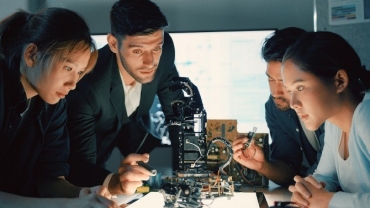

“Focus, focus, focus”: Andrew Heath, Spectris
The role of purpose, focus and clarity in driving transformative change that benefits customers, employees, investors and the environment.
When the external corporate landscape is being shaken up, doubling down on what you do well and focusing on purpose is critical, says Andrew Heath, CEO of Spectris.
“Focus, focus, focus,” says Heath of the need to deliver a clear, coherent strategy that recognises the needs of customers, employees and investors and removes ambiguity on direction and investment.
Spectris provides high-tech instruments, test equipment and software for many of the world's most technically demanding industries, including life sciences and automotive, but Heath says the Group had become distracted through serial acquisitions which had diluted its focus, leading to a change in strategic direction when he joined in 2018.
“We were 14 companies quite loosely federated under an umbrella, but there wasn't a huge amount of overlap between many of the businesses," he explains. “The Group had begun to lose its way in terms of what it stood for and where it was going.”
“We had strong technology, brilliant people and products, with strong heritage in our brands, good customer penetration and good market positions in many cases,” adds Heath. “But we were spreading our focus and attention across too many businesses.”
The value of focus and purpose
Heath says the Group began to target the optimised divestment of businesses unaligned to its core specialism of precision measurement, with a keen focus on strengthening alignment with a redefined purpose.
“We redefined the Group's purpose to fully recognise our role in harnessing the power of precision measurement to make the world cleaner, healthier and more productive,” he says. “We knew this should be our core focus. We began with the sale of businesses supporting fossil fuel markets, including our fracking measurement business and our pulp and paper asset. We then doubled down on our precision measurement businesses in areas such as life sciences, pharmaceuticals, energy transition and electrification of transportation, carbon capture and emissions control.”
“That clear focus on our purpose, aligned to our core specialism has helped transform Spectris into a market leader in precision measurement and a more compelling proposition for all stakeholders.”
“For employees, our focus on purpose is providing clear alignment across a decentralised business structure supporting engagement, while our customers tell us they value our specialism and domain knowledge. Equally, investors appreciate a clear line of sight to our strategy, end markets and future growth projections.”
Heath adds that disposing of assets associated with fossil fuels, combined with the Group’s strong sustainability strategy has made Spectris especially attractive to a growing wave of ESG-focused investors.
“We have put sustainability at the heart of our strategy,” he says. “And that has resonated really well with all stakeholders, and notably our investors. Over the last three to four years, the funds flowing into ESG has been proportionally higher than conventional funds and our share register has developed in line with this trend.”
As well as creating clearer focus and alignment with the Group’s purpose, Heath says the divestments were timed well to enable strategic reinvestment. The sales generated around £1.3 billion, enabling Spectris to maintain a healthy balance sheet, fund new investments in research development and technology, acquire new businesses that complement the Group’s core portfolio and buy back around £650 million of shares.
Harnessing the power of technology
A core strategic priority for the Group has been the commitment to research and development – increasing from 6% of sales to 8%. A focus on technology and software development in particular has enabled Spectris to transform its offering to all customers, including some it may otherwise have lost through its period of divestments.
An example Heath gives relates to the sale of its automotive proving ground business - a physical test site for the development of prototype vehicles.
“We're still doing prototyping, but we’re now doing it virtually,” he says. “We provide a broad range of simulators, where our customers have clocked up over nine million kilometres using them for virtual testing.”
Heath says making the early prototyping stages all virtual, reduces cost and time by around 20% and 50% respectively, and avoids up to 14,000 tCO2e (tonnes of carbon dioxide equivalent) and up to 3,500 sets of tyres per new model.
Connecting business and environmental benefits
Another example, where technology and software development are driving both business and environmental benefits, involves banana leaves.
Handheld, mobile instruments, connected to a cloud-based solution, are being used in plantations to optimise crop yield and reduce harm done to lakes and rivers by fertilisers.
“These devices will tell you very quickly - within a few minutes - what your nitrogen levels are in your banana or sugarcane leaves,” says Heath. “By precisely monitoring crop health, it informs the potential crop yield, helping growers manage the appropriate use of fertilisers.”
Previously that information would have taken up to 30 days to obtain via lab tests, and the delays and resulting uncertainty during critical windows in the growing cycle often led to crops being over-fertilised, and nitrates leaching into water courses, causing algae blooms in lakes and rivers.
“We’ve tried our cloud-based solution with a number of plantations. We can save them millions in terms of fertiliser use, as well as improving the environment.”
It is perhaps an almost too literal example of how focusing on its purpose and specialism has enabled Spectris to overcome the issue of not being able to see the wood for the trees.
“Being really focused on purpose underpins our success,” says Heath.
Contact us














